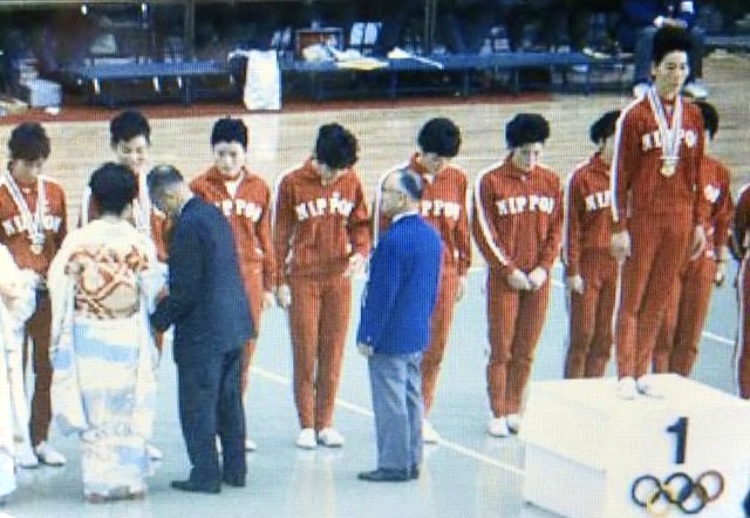During Tokyo 2020 Olympic Games ongoing today it is the Hiroshima Memorial Day – The legacy of Hiroshima Memorial Day serves as Hiroshima and Nagasaki atomic bombing in 1945 -76 years ago – a reminder of nuclear warfare left for humankind – urging end to nuclear deterrence?
UN Secretary-General António Guterres: “The only guarantee against the use of nuclear weapons is their total elimination”, he said in a video message to the Hiroshima Peace Memorial in Japan, held on Friday morning, local time” (UN News 5 August 2021).
“The United States detonated two nuclear weapons over the Japanese cities of Hiroshima and Nagasaki on 6 and 9 August 1945, respectively. The two bombings killed between 129,000 and 226,000 people, most of whom were civilians” (Atomic bombings of Hiroshima and Nagasaki, Wikipedia).
Painful memories of war and postwar rebuilding.
The Asahi Shimbun newspaper and Reuter writes about the games today (6 August 2021) that the organizer International Olympic Committee (IOC) has no plan to mark the moment of silence today a rejection of Hiroshima’s request to honor victims.
During the 1964 Summer Olympics the Japanese women’s volleyball team won the gold medal, with the final being broadcast live – restoring the faith of the peaceful Japan’s people in the painful memories of war and postwar rebuilding. The volleyball team was nicknamed of Nichibo Kaizuka, Oriental Witches.
There is a discourse over their coach Hirofumi Daimatsu a Japanese a military war veteran, a platoon commander in the Imperial Japanese Army in China during WW2 pressing the team to sacrifice everything for the state, coach known as the “demon,” for his brutal methods.
Youtube: Japan Win First Ever Women’s Volleyball Gold – Tokyo 1964 Olympics
https://www.youtube.com/watch?v=coM7vkwh3js
Hiroshima mon amour a 1959 French New Wave romantic drama film directed by French film director Alain Resnais with a screenplay by Marguerite Duras a co-production by companies from both Japan and France. The plot is nonlinear conversations between a French actress, Elle (which means “She”), and a Japanese architect, Lui (which means “Him”). Both character having memories of the war, Elle from France and Lui from Japan.
The film jumps between events in the present with Him and She and documentary film clips usually from Hiroshima but also film clips from her youth in France film leaps (Bordwell / Thompson, 2010, page 413). The film has the structure of the art film with Gaps – gaps in the narrative.
The film’s modernist narration is self-reflective (the viewer is invited to reflect).
Marguerite Duras has built her script for the film as a musical duet with a male and a female voice intertwined across the image offscreen. Often the spectator does not know if it is real dialogues, fanatical dialogues or is a commentator voice of the actors sound track (Bordwell / Thompson, 2010, page 413).
The film’s fragmented structure is reminiscent of Marguerite Duras’ connection to the literary movement The New Novel (fr., Le Nouveau Roman) where style and form are at the center and avoid classic narration to focus on the details of things in the world – completely de-dramatized. Duras also examined “feminine modernism.” – “Her slow, laconic style, with the help of static images and minimal dialogue, seeks a distinctly feminine use of language” (Bordwell / Thompson, 2010: 577).
And one can think of literary influences as Proust’s In Search of Lost Time where memory episodes play an important role. Postwar modernism wanted to be more true to life than classic filmmakers had been. The filmmakers could perhaps seek to reveal unpleasant realities such as the horrors of fascism, and war and occupation (Bordwell / Thompson, 2010, p. 328).
The purpose of the film’s modern storytelling is the question of whether it is better to remember or forget a tragedy? As She and He recall the trauma of the past, they have a chance to reconcile with themselves and renew their lives in the future at the open end of the film.
Duras introduces a stylistic poetic concretisation in the sound of dialogue as competing with the image. The dialogue has musical properties and begins to take shape on a level that is sensory rather than semantic. Some of the most memorable aspects of the film are the actor’s voices reading the script and the rhythmic patterns of repetition and opposition within the dialogue, through which some of the film’s central themes develop. These effects are embedded in the script, which also provides detailed instructions on what tone the script should be read (Davies 2010: 13-14).
The composer of the film music was Giovanni Fusco who worked a lot with Antonioni. A possible association with the form and style of rosy Italian neorealism where it exists, including a sweeping musical score that is reminiscent of how opera phonetically places music as the basis for a stage’s emotional development (Bordwell & Thompson 2010: 333).
The character development is the driving force in the film and can be seen in the plot with the dialogue between Him and Her. 15:41 into the film, she sees the sleeping Japanese man’s hand and gets subjective evocations that are strong anxiety (emotional high point) dramatic, from her memory of her German lover’s hand when he lies dead on the ground. She seems to have difficulty distinguishing between her current lover in Japan and her lover in the past in Germany.
The film climaxes, the climax of the conflict and change becomes when She says “I want to forget you” (fr., Je t’oublierai! Je t’oublierai!) But She quickly changes to “Yes you are Hiroshima!” and She gets the obvious answer that “You are Nevers“. The film ends not only with an open end but with a new possible future. Naming things gives a sense of control and an interpretation a possible experienced catharsis.
Sources:
Atomic bombings of Hiroshima and Nagasaki, Wikipedia
https://en.wikipedia.org/wiki/Atomic_bombings_of_Hiroshima_and_Nagasaki
Tokyo 2020 Olympic Games -News
https://olympics.com/tokyo-2020/en/news/
UN News 5 August 2021: Hiroshima memorial: UN chief laments slow progress on nuclear-free goal
https://news.un.org/en/story/2021/08/1097212
Film: Hiroshima mon amour (1959) Wikipedia
https://en.wikipedia.org/wiki/Hiroshima_mon_amour
Bordwell, David & Kristin Thompson (2010), Film History: An Introduction, McGraw-Hill: New York.
Davies, Rosamund (2010), Screenwriting strategies in Marguerite Duras’s script for ‘Hiroshima, Mon
Amour’ (1960). London: Greenwich Academic Literature Archive.
Oriental Witches Wikipedia
https://en.wikipedia.org/wiki/Oriental_Witches
Iwona Merklejn (2014) The taming of the witch: Daimatsu Hirobumi and coaching discourses of women’s volleyball in Japan, Asia Pacific Journal of Sport and Social Science, 3:2, 115-129, DOI: 10.1080/21640599.2014.924692
IOC has no plan to mark moment of silence on Hiroshima anniversary
https://www.reuters.com/lifestyle/sports/ioc-has-no-plan-mark-moment-silence-hiroshima-anniversary-2021-08-01/
Robert Whiting (Oct 21, 2014), Witches of the Orient’ symbolized Japan’s fortitude, Japan Times
https://www.japantimes.co.jp/sports/2014/10/21/olympics/witches-of-the-orient-symbolized-japans-fortitude/
(Coach) Hirofumi Daimatsu Wikipedia
https://en.wikipedia.org/wiki/Hirofumi_Daimatsu
Hirofumi Daimatsu in the International Volleyball Hall of Fame
https://www.volleyhall.org/hirofumi-daimatsu.html
1964 Summer Olympics
https://en.wikipedia.org/wiki/1964_Summer_Olympics
Volleyball at the 1964 Summer Olympics – Women’s tournament
https://en.wikipedia.org/wiki/Volleyball_at_the_1964_Summer_Olympics_%E2%80%93_Women%27s_tournament
The Asahi Shimbun: Hiroshima stung by refusal to honor A-bomb victims at Games
https://www.asahi.com/ajw/articles/14409110
Japan Times: Hiroshima marks 76th atomic bomb anniversary, urging end to nuclear deterrence
https://www.japantimes.co.jp/news/2021/08/06/national/hiroshima-bombing-76th-anniversary/
Hiroshima Peace Memorial Museum Wikipedia
https://en.wikipedia.org/wiki/Hiroshima_Peace_Memorial_Museum
Hiroshima Peace Memorial
https://en.wikipedia.org/wiki/Hiroshima_Peace_Memorial
Image a the top from WikiMedia: File:Oriental Witches, volleyball at the 1964 Summer Olympics.jpg
https://en.wikipedia.org/wiki/File:Oriental_Witches,_volleyball_at_the_1964_Summer_Olympics.jpg

